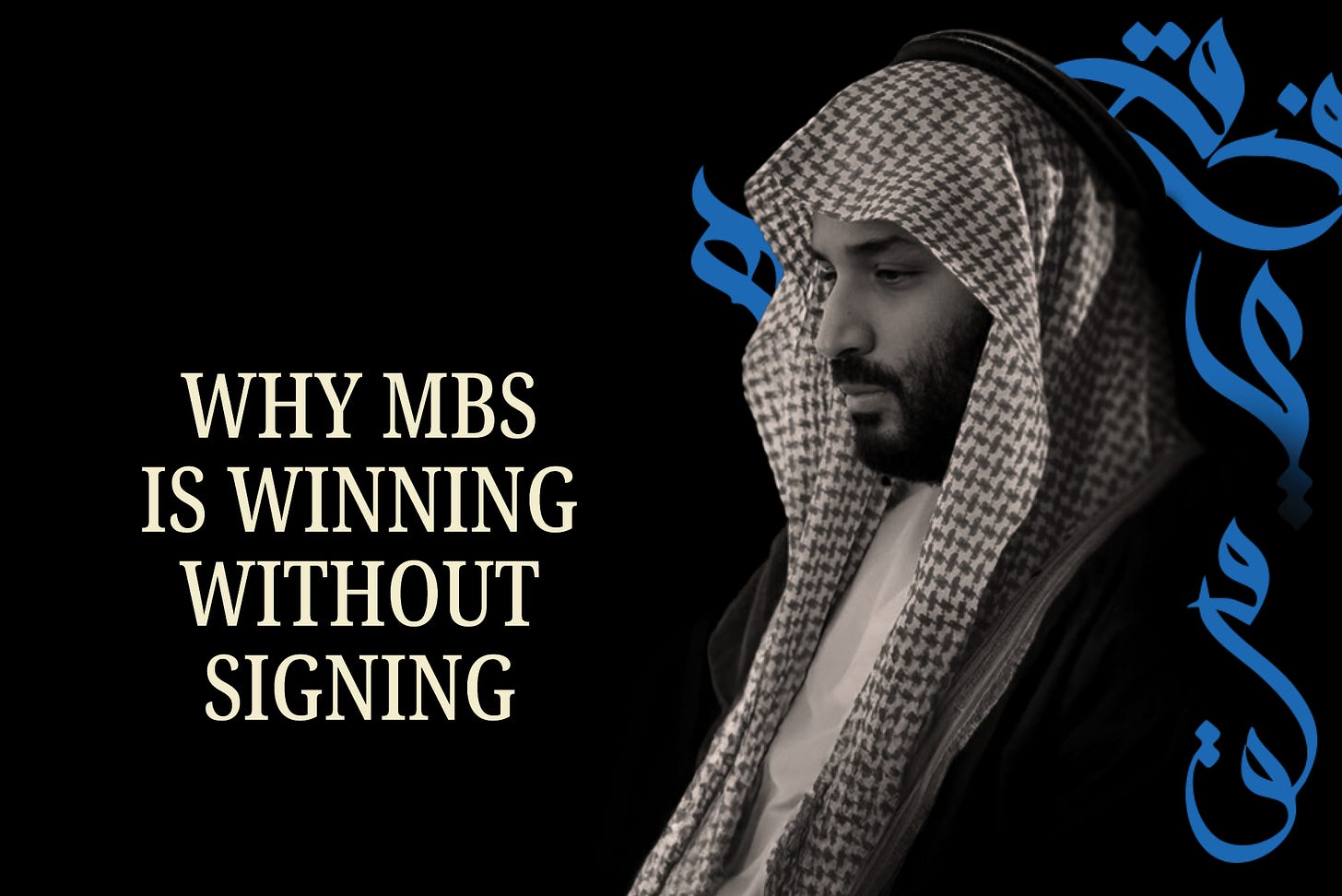Why MBS Is Winning Without Signing
By holding out on normalization, Crown Prince Mohammed bin Salman is increasing Saudi Arabia's leverage across the Middle East
Today, Crown Prince Mohammed bin Salman Al Saud, often referred to as MBS, is being hailed as a hero in Syria. In a country fractured by civil war and foreign control, the arrival of a capable and influential Arab leader marks a major shift. MBS didn’t show up with abstract promises—he acted. And in doing so, he reinforced a message that’s gaining momentum: Saudi Arabia is returning to the center of regional decision-making.
The support extended to Syria wasn’t just humanitarian—it was calculated. It sends a clear signal to allies and rivals alike: Riyadh is stepping into vacuums that others, including Iran, have filled for too long. The goal isn’t charity. It’s strategic containment. Re-engaging Syria on Saudi terms limits Iran’s influence and brings the country back into an Arab sphere of influence. That’s a long-term investment in regional stability—and in Saudi leverage.
This is why the pressure for Saudi Arabia to join the Abraham Accords, while predictable, is largely irrelevant. The Kingdom doesn’t need validation through a rushed agreement. Its influence speaks for itself. By not signing, Riyadh retains maximum bargaining power—not only with Israel and the United States, but with the broader Arab world.
President Trump’s recent comment—“You’ll join the Abraham Accords in your own time”—captures the approach well. Saudi Arabia isn’t operating on anyone’s timeline but its own. That’s not obstinance; it’s strategy. Entering a normalization deal without concrete gains—particularly on the Palestinian issue—would deliver little benefit and create domestic and regional backlash. The Kingdom is not interested in symbolic gestures. It is focused on outcomes.
No one in Ramallah or Gaza will celebrate if Saudi Arabia signs today. But they might take notice if statehood comes first, followed by normalization. That sequencing would shift the narrative and reduce the risk of Saudi Arabia being seen as trading influence for access. It’s about positioning. Riyadh wants to be viewed as a broker, not just another signatory.
This pragmatism is shaped by recent history. The Iran nuclear deal, once touted as a breakthrough, has failed to curb Tehran’s disruptive behavior. On the contrary, Iran has expanded its proxy network and grown more aggressive. Instead of buying moderation, the deal bought time—for Iran. That failure isn’t lost on Saudi policymakers. They know that diplomacy without enforcement doesn’t change realities on the ground. That’s why any deal the Kingdom enters into now must serve clear strategic interests.
Normalization with Israel is not off the table. But it has to deliver more than optics. It must result in actual advantages—economic, security, and geopolitical. And the path to those outcomes involves careful sequencing and leverage, not rushed signatures. Saudi Arabia is already seeing dividends by holding out. It remains central to U.S. and Israeli calculations, and its influence in the Gulf and beyond continues to grow.
In the meantime, Riyadh is investing in areas that matter. Syria is a pilot case. So is Iraq. These engagements aren’t driven by sentiment but by risk-reward calculations. Weak states are security liabilities. By strengthening Arab institutions and reducing Iranian proxies’ reach, Saudi Arabia is building a more favorable regional environment—not just for itself, but for future negotiations.
The Kingdom isn’t acting out of ideological ambition. It’s acting to shape conditions to its advantage. That’s how serious foreign policy is conducted. It’s also why normalization with Israel, when it happens, will mean more. It won’t be driven by pressure or applause. It will be a calculated move at the right time, with measurable benefits in place.
MBS understands the value of leverage. He also understands that influence doesn’t come from how fast you sign an agreement—it comes from shaping the terms of what’s eventually signed. And that’s exactly what Saudi Arabia is doing now.
And that, more than any agreement or photo-op, is what power actually looks like in the Middle East today.
Middle East Uncovered is powered by Ideas Beyond Borders. The views expressed in Middle East Uncovered are those of the authors and do not necessarily reflect the views of Ideas Beyond Borders.




Very insightful. MBS certainly seems on a better, less theologically intense path than Iran’s, or his own father’s.